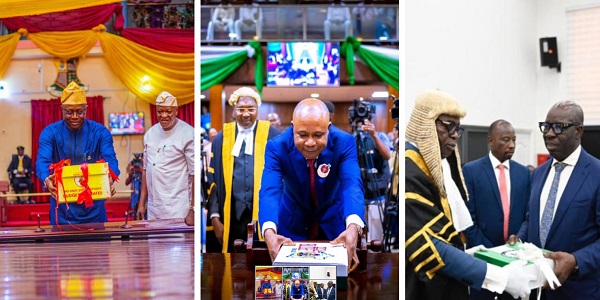Governors Seyi Makinde (Oyo), Peter Mbah (Enugu), Godwin Obaseki (Edo), and Ahmed Aliyu (Sokoto) yesterday presented the 2024 Appropriation Bills to the Houses of Assembly for perusal and passage into law.
Makinde presented N434,221,765,938.79 budget proposal which comprises a Capital Expenditure of N222,337,320,199.85 and a Recurrent Expenditure of N211,884,445,728.95.
The governor said next year’s budget proposal, christened: Budget of Economic Recovery, offers a chance for his administration to show its responsiveness to the current economic realities in the country.
He said the Capital Expenditure is 2.4 per cent higher than the Recurrent Expenditure.
Makinde explained that the budget proposal envisaged an increased Internally Generated Revenue (IGR) of N72 billion with an average of N6 billion monthly.
A breakdown of the proposals showed that Education got the highest share of N90,664,994,252 (20.88 per cent), followed by Infrastructure, which got N74,316,325,706 (17.11 per cent); Health, with N40,998,197,758.30 (9.44 per cent); and Agriculture, with N15,848,707,310.80 (3.65 per cent).
In Enugu State, Governor Mbah presented a budget proposal of N521,561,386,000 to the House of Assembly yesterday in Enugu.
The proposed budget, tagged: Budget of Disruptive Economic Growth, comprises a Recurrent Expenditure of N107,272,660,000, representing 20 per cent; and a Capital Expenditure of N414,334,120,000, representing 80 per cent of the total budget.
Education got the lion’s share of N134.5 billion, representing 33 per cent of the total budget proposal.
Mbah said through the revised budget, his administration had been able to make some appreciable progress in fulfilling its promises to Ndi Enugu in the last few months.
He estimated that the total recurrent revenues in 2024 will amount to ¦ 383,789,000,000.00, as against the approved revised provision for 2023 of ¦ 143,571,592,917.
Giving a breakdown of the projected revenues for 2024, Mbah said the state would generate N252,789,000,000 through Internally Generated Revenue (IGR); N60,000,000,000 through Statutory Revenue; N16,000,000,000 through Excess Crude and others; while N44,000,000,000 and N11,000,000,000 would be earned through Value Added Tax (VAT) and Opening Balance.
In Edo State, Governor Obaseki presented a proposed budget of N325.3 billion, called: Home Run, Finishing Strong, to the 24-member House of Assembly in Benin, the state capital.
The governor said the 2024 Appropriation Bill contains N178 billion for Capital Expenditure, and N146 billion for Recurrent Expenditure. He put the total projected revenue for 2024 at N303 billion. This consists of N55 billion for Statutory Allocation, Value Added Tax (VAT) of N38 billion, Capital Receipts of N40 billion, Internally Generated Revenue (IGR) of N72 billion, and N10 billion from Grants, among others.
Obaseki stressed that the focus areas for the 2024 fiscal year would include growth and employment enablers, such as trailer and transit parks, ICT infrastructure, Benin port projects, which would gulp N85 billion; Road and Transport Infrastructure, N62 billion; Health, N33 billion; Education, N32 billion; and Buildings, Physical Planning and Development Control, N21 billion.
Other areas include Social Welfare/Benefits, N16 billion; Environment, N5 billion; Electricity, N7 billion; Agriculture, N6 billion; and Youth, Social Development and Gender, N6 billion.
In Sokoto State, the House of Assembly yesterday passed for second reading the proposed 2024 Appropriation Bill of N270.1 billion.
The request for this progression came from the Assembly Leader, Alhaji Bello Idris (APC, Gwadabawa North), after a thorough debate on the budget presented by Governor Ahmed Aliyu.
The News Agency of Nigeria (NAN) recalls that the governor presented the proposed 2024 budget to the state legislature last Friday.
Aliyu said the proposed budget, tagged: Budget of Hope and Resilience for Infrastructural Development, consists of Personnel Costs of N46.9 billion; Overhead of N50.9 billion; and Capital Expenditure of N172.2 billion.
The governor said Education got the largest allocation of N42.9 billion, followed by Health’s N31.2 billion; Works and Transport, N18.8 billion; and Agriculture, N10.3 billion.


